As a new class of obesity medications has soared in popularity, so have the online outlets built to get them in the hands of patients. A new analysis of claims data from Trilliant Health suggests that collectively, telehealth companies — in particular, cash-pay options that market directly to consumers — could account for nearly half of the patients with insurance claims for GLP-1 prescriptions in 2022.
Direct-to-consumer telehealth companies have offered an easier on-ramp for many patients to access prescriptions for a variety of conditions. And since the first GLP-1s were approved for obesity — promising up to 15% weight loss — many of those companies have capitalized on the approvals and surging demand to launch new weight loss businesses. Companies including Calibrate and Ro claim to have reached hundreds of thousands of patients with their weight loss medication programs.
advertisement
Collectively, their reach may be even larger. The Trilliant Health analysis, conducted on behalf of STAT, offers an early glimpse of the foothold those businesses have gained in GLP-1 prescribing. In a nationwide claims database of more than 300 million patients using both commercial and federal insurance, Trilliant Health found about 3.6 million people with a prescription claim for a GLP-1 — semaglutide, tirzepatide, or injectable liraglutide without insulin — in 2022. To determine where each patient may have gotten those prescriptions, they looked for a medical visit claim within three days of a prescription claim for a GLP-1 — the visit where the script was likely written. But they only found a matching visit for 53% of patients.
Unlock this article by subscribing to STAT+ and enjoy your first 30 days free!

